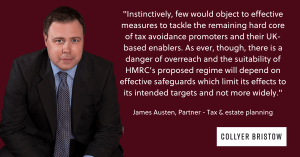- UK trusts, tax and estate planning

Longer Reads
UK – Tackling Tax Avoidance
James Austen reviews potential measures by the UK tax authorities on addressing tax avoidance, including tackling the promoters of avoidance schemes and raising standards in the tax advice market.
4 minute read
Published 4 May 2021
Key information
- Specialisms
- Private Wealth
The U.K. government released its first “Tax Day” consultations on March 23, 2021, following the March 3 budget, on future measures not included in this year’s Finance Bill. The government sensibly refrained from announcing wide-ranging and untimely changes to inheritance tax, capital gains tax, and pension limits and reliefs.
In making its Tax Day announcements, the government signaled a welcome and overdue return to the principle of transparency and prior scrutiny first set out in the 2010 “Protocol” on tax changes. Governments since then have (too-) occasionally paid lip-service to that Protocol, whilst often ignoring it in practice—most recently in last year’s retrospective anti-forestalling measures for the restriction of Entrepreneurs Relief, for example.
The consultations cover a number of areas, though none of them ground-breaking. Those dealing with tax avoidance—and the related issue of professional standards— are considered here.
Tax Gap
The foreword to the Tax Day consultation paper reminds readers that the so-called tax gap is at a record low of 4.7%, of which tax avoidance only counts for 1.7 billion.
pounds ($2.3 billion)—approximately just 5.5% of the total. This is timely and welcome. It compares with 3.1 billion pounds for “error” (surely an entirely avoidable consequence of the U.K.’s over-complicated tax code), and a combined total of 21.3 billion pounds for unlawful actions by taxpayers (including evasion, “criminal attacks,” non-payment, the “hidden economy,” and failure to take reasonable care).
The relative insignificance of avoidance compared with evasion and other unlawful actions in quantitative terms might indicate that the tax gap could best be narrowed by tackling non-compliance other than avoidance. Certainly, HM Revenue & Customs (HMRC) has enjoyed remarkable success in overturning aggressive tax avoidance schemes in the tribunals and courts in recent years, and further returns on investment targeting avoidance will be harder to achieve and less productive.
Nevertheless, with a view to promoting fairness in the tax system, appearing tough on “tax evasion and unacceptable tax avoidance” is never out of fashion, and it is no surprise that proposals for further measures were announced in the consultation. Taxpayers and their advisers might wish to see consultations on more action to tackle error, evasion and the hidden economy in future reviews.
Promoters of tax avoidance schemes
The government wishes to bring additional pressure to bear on promoters of tax avoidance schemes. The reality is that such promoters are now few and far between, and those remaining in the market are normally based outside the U.K., which presents obvious difficulties in taking effective enforcement action against them. There is little or no publicly available quantitative evidence, but one suspects there remains a small but stubborn market for aggressive avoidance schemes, and the die-hard remnants of the scheme promoters’ industry persists in developing and promoting such schemes.
Interestingly, the consultation appears to proceed on the assumption that users of marketed tax avoidance schemes need protecting from the scheme promoters, and making them “better informed about promoter activities and the risks of getting involved with tax avoidance” will assist.
In the past, when schemes were often marketed to unsophisticated taxpayers, that assumption might have been fair. Certainly, the fact that many innocent taxpayers (including some in the public sector) were seemingly forced by their employers into disguised remuneration schemes (which are now subject to the controversial loan charge) is scandalous evidence of that. But it is not at all clear that it remains the case. Given the extraordinary level of public scrutiny of tax in recent years, one suspects that all or most scheme users know precisely what they are becoming involved with, and wish to proceed nevertheless.
HMRC wants to break the ties between offshore promoters and those U.K. businesses which profit from implementing their schemes. It proposes a four-pronged approach:
- Clamping down on promoters who “dissipate or hide their assets” to avoid paying penalties under the existing regime;
- “Tackling offshore promoters through the UK entities that support them” by pursuing the U.K. entities for penalties linked to their involvement in the offshore promoter’s business;
- Disrupting the business activities of companies involved in promoting or enabling tax avoidance by closing them down where it has been shown they are not operating in the public interest and disqualifying the directors at the earliest point possible; and
- “Supporting taxpayers in steering clear of tax avoidance schemes” by providing more information on promoters and their schemes.
Most interesting is the second proposal, under which U.K. facilitators of offshore
promoters would face heavy new financial penalties, with the possibility of having
their assets frozen by HMRC to secure those penalties. Limited safeguards would
apparently be introduced alongside the new regime.
Instinctively, few would object to effective measures to tackle the remaining hard
core of tax avoidance promoters and their U.K.-based enablers, and the consultation
notes that it is not targeted at legitimate tax advisers. As ever, though, there is a
danger of overreach and the suitability of HMRC’s proposed regime will depend on
effective safeguards which limit its effects to its intended subjects and ensure that
they do not affect others. In particular, the perennial issue of satisfactory definitions
of “avoidance” and similar concepts present a significant issue.
Raising standards in the tax advice market
Related to the government’s proposed crackdown on those facilitating avoidance is
the welcome consultation on “raising standards in the tax advice market,” in which it
is proposed that all U.K. tax advisers will be compelled to have professional
indemnity insurance. Reputable professionals such as solicitors, accountants and
chartered tax advisers are already insured, so the change would only affect
unregulated firms.
The reality is that the risk profile of some unregulated tax advisory practices is such
that insurance will be unobtainable for them—at least at an economic cost.
A requirement to have professional indemnity insurance would force some
unregulated tax advisers to lower their risk profile by changing their business model
and work practices, or else ensure they close their doors. As such, it may well
increase the cost of tax advice for users of those unregulated businesses.
There is currently no evidence on the impact of such a move, though hopefully the
consultation will enable that evidence to be collated and published. Conversely,
reputable regulated firms have nothing to fear from these proposals, and potentially
much to gain from a more level playing field.
Tackling Disguised Remuneration tax avoidance and off-payroll working rules
Both disguised remuneration (and the controversial loan charge) and off-payroll
working (“IR35” and related provisions) are topical, though neither enamors HMRC
to affected taxpayers. Both are clearly still on HMRC’s radar, though no new
measures specifically targeting them are announced in the command paper, which
will be a relief to many.
No safe havens
HMRC has published two rather curious discussion documents, which contain details
of how HMRC uses data received via the various international tax transparency and
reporting schemes, such as the common reporting standard (CRS) and the Foreign
Account Tax Compliance Act (FATCA). These contain consultation questions
intended “to inform future policy measures”, but they contain no firm proposals about
improving taxpayer compliance.
The “Helping taxpayers get offshore tax right” discussion document does contain a
fascinating insight into HMRC’s use of data in its offshore tax compliance
procedures. One suspects those details will appeal only to tax professionals rather
than the average taxpayer with non-U.K. assets.
HMRC’s general approach to promoting compliance “by designing it into our systems
and processes” is certainly to be welcomed: the key to high levels of compliance is to
make it easy for taxpayers to achieve. This is especially important given the U.K.’s
regrettably complex tax code. Even if reforms to tax legislation will necessarily be
gradual, there is no reason why HMRC’s internal systems and processes cannot be
streamlined and improved to make the experience of taxpayers and their advisers
better when engaging with HMRC.
To state the obvious, the simpler it is to pay the right amount of tax, the greater the
likelihood that it will be paid.
In conclusion
The U.K. government released modest but generally welcome proposals intended to
update current practices with a view to making the U.K.’s tax system work more
effectively.
One wonders whether the slim announcements on the first Tax Day were the result
of a calculated positive decision because the government wanted to take credit for
the exercise itself, rather than for any given policy announcement to draw away
attention. In any event, all those with an interest in tax should be pleased that the
government made a marked return to the principles of the 2010 Protocol on tax
changes and has committed itself to prior notification and consultation. Long may
that last.
Related content
Longer Reads
UK – Tackling Tax Avoidance
James Austen reviews potential measures by the UK tax authorities on addressing tax avoidance, including tackling the promoters of avoidance schemes and raising standards in the tax advice market.
Published 4 May 2021
Associated sectors / services
Authors
The U.K. government released its first “Tax Day” consultations on March 23, 2021, following the March 3 budget, on future measures not included in this year’s Finance Bill. The government sensibly refrained from announcing wide-ranging and untimely changes to inheritance tax, capital gains tax, and pension limits and reliefs.
In making its Tax Day announcements, the government signaled a welcome and overdue return to the principle of transparency and prior scrutiny first set out in the 2010 “Protocol” on tax changes. Governments since then have (too-) occasionally paid lip-service to that Protocol, whilst often ignoring it in practice—most recently in last year’s retrospective anti-forestalling measures for the restriction of Entrepreneurs Relief, for example.
The consultations cover a number of areas, though none of them ground-breaking. Those dealing with tax avoidance—and the related issue of professional standards— are considered here.
Tax Gap
The foreword to the Tax Day consultation paper reminds readers that the so-called tax gap is at a record low of 4.7%, of which tax avoidance only counts for 1.7 billion.
pounds ($2.3 billion)—approximately just 5.5% of the total. This is timely and welcome. It compares with 3.1 billion pounds for “error” (surely an entirely avoidable consequence of the U.K.’s over-complicated tax code), and a combined total of 21.3 billion pounds for unlawful actions by taxpayers (including evasion, “criminal attacks,” non-payment, the “hidden economy,” and failure to take reasonable care).
The relative insignificance of avoidance compared with evasion and other unlawful actions in quantitative terms might indicate that the tax gap could best be narrowed by tackling non-compliance other than avoidance. Certainly, HM Revenue & Customs (HMRC) has enjoyed remarkable success in overturning aggressive tax avoidance schemes in the tribunals and courts in recent years, and further returns on investment targeting avoidance will be harder to achieve and less productive.
Nevertheless, with a view to promoting fairness in the tax system, appearing tough on “tax evasion and unacceptable tax avoidance” is never out of fashion, and it is no surprise that proposals for further measures were announced in the consultation. Taxpayers and their advisers might wish to see consultations on more action to tackle error, evasion and the hidden economy in future reviews.
Promoters of tax avoidance schemes
The government wishes to bring additional pressure to bear on promoters of tax avoidance schemes. The reality is that such promoters are now few and far between, and those remaining in the market are normally based outside the U.K., which presents obvious difficulties in taking effective enforcement action against them. There is little or no publicly available quantitative evidence, but one suspects there remains a small but stubborn market for aggressive avoidance schemes, and the die-hard remnants of the scheme promoters’ industry persists in developing and promoting such schemes.
Interestingly, the consultation appears to proceed on the assumption that users of marketed tax avoidance schemes need protecting from the scheme promoters, and making them “better informed about promoter activities and the risks of getting involved with tax avoidance” will assist.
In the past, when schemes were often marketed to unsophisticated taxpayers, that assumption might have been fair. Certainly, the fact that many innocent taxpayers (including some in the public sector) were seemingly forced by their employers into disguised remuneration schemes (which are now subject to the controversial loan charge) is scandalous evidence of that. But it is not at all clear that it remains the case. Given the extraordinary level of public scrutiny of tax in recent years, one suspects that all or most scheme users know precisely what they are becoming involved with, and wish to proceed nevertheless.
HMRC wants to break the ties between offshore promoters and those U.K. businesses which profit from implementing their schemes. It proposes a four-pronged approach:
- Clamping down on promoters who “dissipate or hide their assets” to avoid paying penalties under the existing regime;
- “Tackling offshore promoters through the UK entities that support them” by pursuing the U.K. entities for penalties linked to their involvement in the offshore promoter’s business;
- Disrupting the business activities of companies involved in promoting or enabling tax avoidance by closing them down where it has been shown they are not operating in the public interest and disqualifying the directors at the earliest point possible; and
- “Supporting taxpayers in steering clear of tax avoidance schemes” by providing more information on promoters and their schemes.
Most interesting is the second proposal, under which U.K. facilitators of offshore
promoters would face heavy new financial penalties, with the possibility of having
their assets frozen by HMRC to secure those penalties. Limited safeguards would
apparently be introduced alongside the new regime.
Instinctively, few would object to effective measures to tackle the remaining hard
core of tax avoidance promoters and their U.K.-based enablers, and the consultation
notes that it is not targeted at legitimate tax advisers. As ever, though, there is a
danger of overreach and the suitability of HMRC’s proposed regime will depend on
effective safeguards which limit its effects to its intended subjects and ensure that
they do not affect others. In particular, the perennial issue of satisfactory definitions
of “avoidance” and similar concepts present a significant issue.
Raising standards in the tax advice market
Related to the government’s proposed crackdown on those facilitating avoidance is
the welcome consultation on “raising standards in the tax advice market,” in which it
is proposed that all U.K. tax advisers will be compelled to have professional
indemnity insurance. Reputable professionals such as solicitors, accountants and
chartered tax advisers are already insured, so the change would only affect
unregulated firms.
The reality is that the risk profile of some unregulated tax advisory practices is such
that insurance will be unobtainable for them—at least at an economic cost.
A requirement to have professional indemnity insurance would force some
unregulated tax advisers to lower their risk profile by changing their business model
and work practices, or else ensure they close their doors. As such, it may well
increase the cost of tax advice for users of those unregulated businesses.
There is currently no evidence on the impact of such a move, though hopefully the
consultation will enable that evidence to be collated and published. Conversely,
reputable regulated firms have nothing to fear from these proposals, and potentially
much to gain from a more level playing field.
Tackling Disguised Remuneration tax avoidance and off-payroll working rules
Both disguised remuneration (and the controversial loan charge) and off-payroll
working (“IR35” and related provisions) are topical, though neither enamors HMRC
to affected taxpayers. Both are clearly still on HMRC’s radar, though no new
measures specifically targeting them are announced in the command paper, which
will be a relief to many.
No safe havens
HMRC has published two rather curious discussion documents, which contain details
of how HMRC uses data received via the various international tax transparency and
reporting schemes, such as the common reporting standard (CRS) and the Foreign
Account Tax Compliance Act (FATCA). These contain consultation questions
intended “to inform future policy measures”, but they contain no firm proposals about
improving taxpayer compliance.
The “Helping taxpayers get offshore tax right” discussion document does contain a
fascinating insight into HMRC’s use of data in its offshore tax compliance
procedures. One suspects those details will appeal only to tax professionals rather
than the average taxpayer with non-U.K. assets.
HMRC’s general approach to promoting compliance “by designing it into our systems
and processes” is certainly to be welcomed: the key to high levels of compliance is to
make it easy for taxpayers to achieve. This is especially important given the U.K.’s
regrettably complex tax code. Even if reforms to tax legislation will necessarily be
gradual, there is no reason why HMRC’s internal systems and processes cannot be
streamlined and improved to make the experience of taxpayers and their advisers
better when engaging with HMRC.
To state the obvious, the simpler it is to pay the right amount of tax, the greater the
likelihood that it will be paid.
In conclusion
The U.K. government released modest but generally welcome proposals intended to
update current practices with a view to making the U.K.’s tax system work more
effectively.
One wonders whether the slim announcements on the first Tax Day were the result
of a calculated positive decision because the government wanted to take credit for
the exercise itself, rather than for any given policy announcement to draw away
attention. In any event, all those with an interest in tax should be pleased that the
government made a marked return to the principles of the 2010 Protocol on tax
changes and has committed itself to prior notification and consultation. Long may
that last.
Associated sectors / services
- UK trusts, tax and estate planning
Authors
Need some more information? Make an enquiry below.
Subscribe
Please add your details and your areas of interest below
Article contributor
James
AustenPartner
Specialising in UK trusts, tax & estate planning, Private wealth, Tax disputes & investigations and Trusts & Inheritance disputes
Enjoy reading our articles? why not subscribe to notifications so you’ll never miss one?
Subscribe to our articlesMessage us on WhatsApp (calling not available)
Please note that Collyer Bristow provides this service during office hours for general information and enquiries only and that no legal or other professional advice will be provided over the WhatsApp platform. Please also note that if you choose to use this platform your personal data is likely to be processed outside the UK and EEA, including in the US. Appropriate legal or other professional opinion should be taken before taking or omitting to take any action in respect of any specific problem. Collyer Bristow LLP accepts no liability for any loss or damage which may arise from reliance on information provided. All information will be deleted immediately upon completion of a conversation.
Close























































